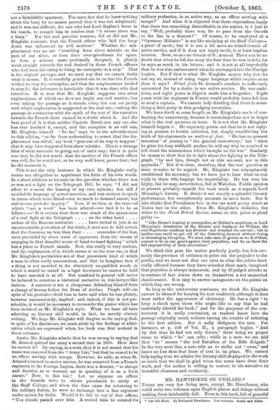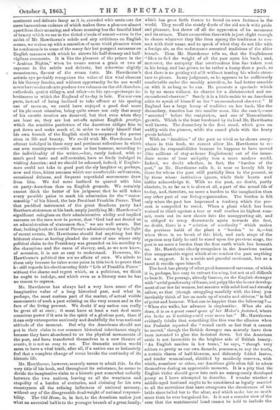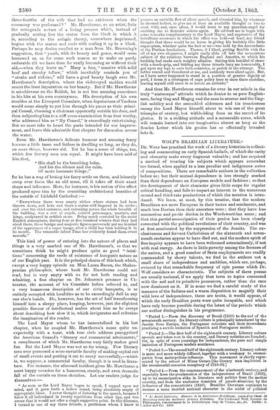MR. HAWTHORNE ON ENGLAND.*
THERE are very few living men, except Mr. Hawthorne, who could write two volumes upon English places and things without making them intolerably dull. Even in this book, full of graceful * Our Old Home. By Nathaniel liawthorne. Two volumes. Smith and Elder. sentiment and delicate fancy as it is, crowded with sentences the mere harmonious cadence of which makes them a pleasure almost apart from their meaning, and whose meaning has the fanciful kind of beauty which we see in the tinted clouds of sunset—even in the midst of Mr. Hawthorne's subtle and airy criticisms on English scenes, we waken up with a sensation of more vivid pleasure when he condescends to some of the many fair but pungent sarcasms on English manners with which he strews his half-dreamy and half- vigilant comments. It is like the pleasure of the prince in the 'Arabian Nights," when be comes across a grain or two of cayenne in the subtle and delicate, hut otherwise slightly monotonous, flavour of the cream tarts. Mr. Hawthorne's artistic eye probably recognizes the value of this vital element in his literary fancies, and without opportunity for its use would neverhaveundertakento produce two volumes on the old churches, cathedrals, quaint villages, and other—to his eye—grotesque in- heritances to which the England of to-day is heir. For our own parts, instead of being inclined to take offence at his sparing use of sarcasm, we could have enjoyed a good deal more of its pleasant stimulus, being quite aware not only that many of his caustic touches are deserved, but that even when they are least so, they are but set-offs against English prestige, which the sensitive patriotism of the American obliges him to put down and make much of, in order to satisfy himself that his own branch of the English stock has surpassed the parent stem in life and beauty. We could wish Mr. Hawthorne had oftener indulged in these racy and pertinent reflections in which our own countrymen—with more or less humour, according to the individuality of the writer,—but, rarely indeed, with so much good taste and self-restraint, have so freely indulged in visiting America ; and we should be ashamed, indeed, if English- men could not take in good part the sly laughter or, perhaps, now and then, bitter sarcasm which our comfortable self-esteem, occasional dulness, and frequent superficial moroseness draw from him. We feel more inclined to quarrel with him on party-American than on English grounds. We certainly cannot think the better of his judgment that he still takes every possible pains to mark his admiration for the " states- manship " of his friend, the late President Franklin Pierce. That that purblind instrument of the great Southern party had Southern statesmen at his back, amply justifying Mr. Hawthorne's significant eulogium on their administrative ability and implied sarcasm on the men now in power, that "God had not denied us an administration of statesmen then," we are well aware. But that, looking back at G-aneral Pierce's administration by the light of recent events, Mr. Hawthorne should feel anything but the bitterest shame at having pleaded the cause of one whose only political claim to the Presidency was grounded on his servility to the champions and the cause of slavery, and, as we now know, of secession, it is not so easy to understand. However, Mr. Hawthorne's political ties are no affairs of ours. We allude to them only because he takes some pains in this book to prove that hs still regards his electioneering little "Life of Franklin Pierce" without the shame and regret which, as a politician, we think he ought to indulge, and which even as a literary man be has no reason to repress.
Mr. Hawthorne has always had a very keen sense of the imaginative value of a long historical past, and what is, perhaps, the most curious part of the matter, of actual visible monuments of such a past existing on the very scenes and in the face of the living present. We doubt if any nation can really be great all at once ; it must have at least a vast deal more conscious power if it acts in the spirit of a glorious past, than if it can only extemporize anxiously and doubtfully the true national attitude of the moment. But why the Americans should not put in their claim to our common historical inheritance simply because they have abandoned to tie the physical monuments of the past, and have transferred themselves to a new theatre of everits, it is not so easy to see. The dramatic unities would seem to have a vital truth, after all, if a nation can so intimately feel that a complete change of scene breaks the continuity of its historic life.
Mr. Hawthorne, however, scarcely seems to admit this. In the very title his book, and throughout its substance, he seems to divide the imaginative claim to a historic past somewhat unfairly between the two nations, leaving us all the weariness and stupidity of a burden of centuries, and claiming for his own countrymen all the refining influences of national memory, without any of the disagreeable dead-weight of national responsi- bility. The Old Rome, is, in fact, to the American nation just what an ancestral hall is to the younger branch of a great family,
which has gone forth thence to found its own fortunes in the world. They recall the stately sheds of the old stock with pride and pleasure, but throw off all the oppression of its meanness and its crimes. Their connection therewith is just slight enough to choose whatever they like from ainong the traditions to con- nect with their name, and to speak of what they do not like with a foreign air, as the unfortunate ancestral traditions of the elder
branch. Thus, Mr. Hawthorne tells Us, that the Englishman
"likes to feel the weight of all the past upon his hack; and, moreover, the antiquity that overburdens him has taken root
in his being, and has grown to be rather a bump than a pack, so that there is no getting rid of it without tearing his whole struc- ture to pieces. In my judgment, as he appears to be sufficiently comfortable under the mouldy accretion, he had better stumble on with it as long as he can. He presents a spectacle which is by no mean without its charms for a disinterested and un- encumbered observer." Surely it is a little unfair to an American critic to speak of himself as the " unencumbered observer." If England has a large hump of tradition on her back, like the dromedary, America has two smaller ones, like the cam31,—one "accreted" before the emigration, and one of Transatlantic growth. Which is the least burdened by its load Mr. Hawthorne well knows. The dromedary is the fleet steed, which goes on swiftly with the pioneer, while the camel plods with the heavy goods behind.
With an " intuition " of the past so vivid as he shows every- where in this book, we cannot allow Mr. Hawthorne to re- pudiate its responsibilities because he happens to have moved (like millions of stay-at-home Englishmen) out of the imme- diate scene of hoar antiquity into a more modern world. Indeed, we doubt whether, in fact, the "burden of the past," as Mr. Hawthorne calls it, is near so keenly felt by those for whom the past still partially lives in the present, as by those whose institutions ignore, while their hearts and habits acknowledge it. With us the past, no doubt, partly obsolete, is, so far as it is alive at all, a part of the actual life of to-day, and, therefore, no more a burden to the imagination than any other part of our living organization. The burden is felt only when the past has impressed a tendency which the pre- sent is compelled to resist. When a plant which has been trained to climb against a tree or wall reaches its highest sum- mit, casts out its new shoots into the uusupporting air, and is obliged to creep downwards again towards the foot, no doubt, there is a " solution of continuity" which makes the previous habit of the plant a " burden " to it,—but when there is no break of this kind, and each stage of the organism may fairly be said to stand upon the previous stage, the past is no more a burden than the firm earth which lies beneath us. Mr. Hawthorne clearly recognizes in . the American nation this unappeasable regret which alone renders the past anything but a support. It is a noble and graceful sentiment, but as a taunt it recoils upon himself.
The book has plenty of other good-humoured sarcasms, of which it is, perhaps, less easy to extract the sting, but not at all difficult to bear it. The passage, already famous, on the English dowager with "awful ponderosity of frame, not pulpy like the looser develop- ment of our few fat women, but massive with solid beef and streaky tallow, so that (though struggling manfully with the idea) you inevitably think of her as made up of steaks and sirloins," is full of point and humour. What can be happier than the following 7— "When she walks, her advance is elephantine. Inert she sits down, it is on a great round space of her Mther's footstool, where she looks as if nothing could ever move her." Mr. Hawthorne evidently thinks that something like this was the allusion when the Psalmist reported the "round earth so fast that it cannot be moved," though the British dowager can scarcely have then been invented to glue the footstool down. Yet the American critic is not insensible to the brighter side of British beauty. "An English maiden in her teens," he says, " though very seldom so pretty as our own damsels, possesses, to say the truth, a certain charm of half-blossom, and delicately folded leaves, and tender womanhood, shielded by maidenly reserves, with which, somehow or other, our American girls often fail to adorn themselves during an appreciable moment. It is a pity that the English violet should grow into such an outrageously developed peony as I have attempted to describe. I wonder whether a middle-aged husband ought to be considered as legally married to all the accretions that have overgrown the slenderness of his bride since he led her to the altar, and which make her so much more than he ever bargained for. Is it not a sounder view of the case that the matrimonial bond cannot be held to include the three-fourths of the wife that had no existence when the ceremony was performed ?" Mr. Hawthorne, as an artist, feels the retrograde nature of a living process which, instead of gradually setting free the statue from the block in which it is, according to the artialic theory, somewhere imprisoned, begins with the statue and ends with sealing it up in a block. Perhaps he may derive comfort as a man from Mr. Browning's suggestion, that " youth, with its beauty and grace, would seem bestowed on us for some such reason as to make us partly endurable till we have time for really becoming so without their aid,—when they leave us." Many a face, "massive with solid beef and streaky tallow," which inevitably reminds you of "steaks and sirloins," will have a good hearty laugh over Mr. Hawthorne's description, wild() the violet-eyed maiden would resent the least imputation on her beauty. But if Mr. Hawthorne is mischievous on the Mitish, he is not less amusing sometimes in his hits at his own countrymen. His description of his own troubles at the Liverpool Consulate, when deputations of Yankees would come simply to put him through his paces as their princi- pal Consul, choosing a chairman apparently outside his door, and then subjectinghim to a stiff cross-examination from that worthy, who addressed him as "My Consul," is exceedingly entertaining. But we must take to heart the parts intended for our improve- ment, and leave this admirable first chapter for discussion across the water.
Even Mr. Hawthorne's delicate humour and amusing fancy become a little tame and listless in dwelling so long, as they do, on more thinys, however old. Yet he has a sense of things, too, which few literary men can equal. It might have been said of him that, "ills shall be the breathing balm, And his the silence and the calm, Of mute insensate things ;" for be has a way of letting his fancy settle on them, and leisurely creep over them like an old moss, till it takes off their exact shape and influence. Here, for instance, is his notion of the effect produced upon him by the crumbling architectural beauties of the outside of Lichfield Cathedral :-
" Everywhere there were empty niches where statues had been thrown down, and here and there a statue still lingered in its niche ; and over the chief entrance, and extending across the whole breadth of the building, was a row of angels, sainted personages, martyrs, and kings, sculptured in reddish stone. Being much corroded by the moist English atmosphere, during four or five hundred winters that they had stood there, these benign and majestic figures perversely put me in mind of the appearance of a sugar image, after a child has been holding it in its mouth. The venerable infant Time has evidently found them sweet morsels."
This kind of power of entering into the nature of places and things is a very marked one of Mr. Hawthorne's, so that we sometimes think he might produce quite as good " intui- tions" concerning the mode of existence of inorganic nature as of our English past. It is the principal charm of this book which, except a very happy episode on Miss Laura Bacon, the Shakes- pearian philosopher, whose book Mr. Hawthorne could not read, but is very angry with us for not both reading and admiring, a fine chapter on Dr. Johnson's penance in TA- toxeter, the account of his Consulate before referred to, and a very humorous description of our civic banquets, is so entirely occupied with localities as to be exceedingly dull in any one else's bands. He, however, has the art of half transforming himself into a sleepy place, keeping, however, just the slightest possible flavour of intellectual malice about him as he creeps about describing how slow it is, which invigorates and refreshes the imagination of the reader.
The Lord Mayor whom he has immortalized in his last chapter, When he coupled Mr. Hawthorne's name quite un- expectedly with a toast, with true civic address panegyrized the American Consul's "literary and commercial attainments," a compliment of which Mr. Hawthorne very fairly makes good fun. But the Lord Mayor was not so far wrong. Few literary men ever possessed a more enviable faculty of making capital out of small events and putting it out to usury successfully,—which is, we suppose, a commercial faculty, though it is used in litera- ture. For instance, the aforesaid incident gives Mr. Hawthorne a most happy occasion for a humorous, stately, and even dramatic fall of the curtain on these sketches. Let our readers judge for themselves :—
"As soon as the Lord Mayor began to speak, I rapped upon my mind, and it gave forth a hollow sound, being absolutely empty of appropriate ideas. I never thought of listening to the speech, because I knew it all beforehand in twenty repetitions from other lips, and was aware that it would not offer a single suggestive point. In this dilemma, I turned to one of my three friends, a gentleman whom I knew to possess an enviable flow of silver speech, and obtested him, by whatever he deemed holiest, to give me at least an available thought or two to' start with; and, once afloat, I would trust to my guardian-angel for enabling me to flounder ashore again. He advised me to begin -with some remarks complimentary to the Lord Mayor, and expressive of the hereditary reverence in which his office was held—at least, my friend thought that there would be no harm in giving his lordship this little- sugar-plum, whether quite the fact or no—was held by the descendants of the Puritan forefathers. Thence, if I liked, getting flexible with the oil of my own eloquence, I might easily slide off into the momentous subject of the relations between England and America to which his lordship had made such weighty allusion. Seizing this liLdful of straw with a death-grip, and bidding my three friends bury me honourably, I got upon my legs to save both countries, or perish in the attempt. The tables roared and thundered at me, and suddenly were silent again. But, as I have never happened to stand in a position of greater dignity or peril, I deem it a stratagem of sage policy here to close these sketches, leaving myself still erect in so heroic an attitude."
And thus Mr. Hawthorne remains for ever in our minds in the truly "statuesque" attitude which he denies to us poor English- men, facing Gog and Magog and the man in armour and the Eng- lish nobility and the assembled aldermen and his treacherous enemy the Lord Mayor himself, about to win one of the great triumphs of oratory, but withholding from us the secret of its. glories. It is a striking attitude and a memorable scene, which will remain burned into our imagination almost as long as the Scarlet Letter which his genius has so effectually branded into it.
































 Previous page
Previous page